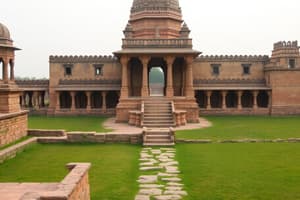Podcast
Questions and Answers
How does the term 'C.E.' relate chronologically to 'B.C.' and 'A.D.'?
How does the term 'C.E.' relate chronologically to 'B.C.' and 'A.D.'?
- 'C.E.' falls between 'B.C.' and 'A.D.'
- 'C.E.' encompasses both 'B.C.' and 'A.D.' eras.
- 'C.E.' represents a period before 'B.C.'
- 'C.E.' is equivalent to 'A.D.', representing the time after the traditionally recognized birth of Jesus. (correct)
What is the key distinction between an abbey and a cathedral?
What is the key distinction between an abbey and a cathedral?
- Abbeys are typically smaller and more rural than cathedrals.
- Abbeys are communities for monks or nuns, while cathedrals are the principal church of a diocese, associated with a bishop. (correct)
- Abbeys are headed by abbesses, while cathedrals are headed by bishops.
- Abbeys are administrative centers, while cathedrals are places of communal living.
How does 'monasticism' contrast with a typical secular lifestyle?
How does 'monasticism' contrast with a typical secular lifestyle?
- Monasticism involves a communal lifestyle centered around family, while secular life stresses solitude and self-denial.
- Monasticism encourages engagement with political affairs, while secular life prioritizes spiritual contemplation.
- Monasticism focuses on accumulating wealth, while secular life emphasizes community service.
- Monasticism centers around religious isolation and self-discipline, while secular life is typically integrated into society. (correct)
What was the primary aim of the 'Inquisition' as established by Pope Gregory IX?
What was the primary aim of the 'Inquisition' as established by Pope Gregory IX?
How does the role of a 'Deacon' differ from that of a priest in Catholic, Anglican, and Orthodox Churches?
How does the role of a 'Deacon' differ from that of a priest in Catholic, Anglican, and Orthodox Churches?
What characterizes a 'Pogrom' and what is its historical context?
What characterizes a 'Pogrom' and what is its historical context?
How would the concept of 'Divine Office' manifest in the daily life of a religious person?
How would the concept of 'Divine Office' manifest in the daily life of a religious person?
What distinguishes 'Heresy' from 'Orthodoxy'?
What distinguishes 'Heresy' from 'Orthodoxy'?
What practical steps were recommended to prevent 'The Black Death'?
What practical steps were recommended to prevent 'The Black Death'?
Flashcards
Abbey
Abbey
Building occupied by a community of monks or nuns.
Abbess
Abbess
Female superior of a community of nuns in an abbey.
A.D. (Anno Domini)
A.D. (Anno Domini)
Medieval Latin for 'in the year of the Lord'.
Alleluia
Alleluia
Signup and view all the flashcards
B.C. (Before Christ)
B.C. (Before Christ)
Signup and view all the flashcards
Cathedral
Cathedral
Signup and view all the flashcards
C.E.
C.E.
Signup and view all the flashcards
Censure
Censure
Signup and view all the flashcards
Council
Council
Signup and view all the flashcards
Catacombs
Catacombs
Signup and view all the flashcards
Study Notes
- Terms glossary from c.650 C.E - c.1750 C.E
Terms and definitions
- Abbey: Building occupied by a community of monks or nuns.
- Abbess: The female superior of a community of nuns in an abbey.
- A.D.: Medieval Latin term "anno Domini" meaning "in the year of the Lord".
- Often presented using "our Lord" instead of "the Lord".
- Taken from "anno Domini nostri Jesu Christi", translating to "in the year of our Lord Jesus Christ".
- Alleluia: Expression meaning "God be praised," uttered in worship or rejoicing.
- Agnus Dei: Figure of a lamb bearing a cross or flag, as an emblem of Christ.
- Invocation beginning with the words ‘Lamb of God' forming a set part of the Mass.
- B.C.: Abbreviation for Before Christ, used in the Christian calendar to refer to a year before Jesus Christ was born.
- The Battle of Actium took place in 31 BC.
- Cathedral: Principal church of a diocese, with which the bishop is officially associated.
- C.E.: Stands for "common" or "current" era".
- BCE: Stands for "before the common (or current) era".
- These abbreviations have a shorter history than BC and AD, dating back to at least the early 1700s.
- Censure: Expression of severe disapproval of someone or something, especially in a formal statement.
- Council: Advisory, deliberative, or administrative body of people formally constituted and meeting regularly.
- Example: "an official human rights council".
- Catacombs: Underground cemetery consisting of subterranean gallery with recesses for tombs, as constructed by the ancient Romans.
- Crusade: Medieval military expeditions made by Europeans to the Holy Land in the 11th, 12th, and 13th centuries.
- Deacon: Ordained minister in Catholic, Anglican & Orthodox Churches with an order below the priest.
- Divine / Divinity: Religious being, like a god or angel.
- Divinity: Study of religion. Divine means holy or sacred.
- Divine Office: Also known as the Liturgy of the Hours or the Work of God (Opus Dei).
- Daily prayer of the Church, marking the hours and sanctifying the day with prayer.
- Hours are a meditative dialogue on the mystery of Christ, using scripture and prayer.
- Ecumenical: Representing a number of different Christian Churches.
- Eucharist: Christian service/ceremony/sacrament commemorating the Last Supper.
- Bread and wine are consecrated and consumed.
- Excommunication: Officially excluding someone from participation in the sacraments and services of the Christian Church.
- Gentile: Not Jewish.
- Heresy: Belief/opinion contrary to orthodox religious (especially Christian) doctrine.
- Heretic: Person believing in or practicing religious heresy.
- Holy War: Declared war in support of a religious cause.
- Humanity: Human beings collectively.
- Inquisition: Period of prolonged and intensive questioning.
- Kyrie Eleison: Ecclesiastical tribunal established by Pope Gregory IX c. 1232 for heresy suppression.
- Active in northern Italy and southern France, becoming notorious for torture use.
- Revived in 1542 to combat Protestantism, eventually becoming an organ of papal government.
- Liturgy of the Hours: Also known as the Divine Office or the Work of God (Opus Dei).
- Daily prayer of the Church marking the hours of each day and sanctifying the day with prayer.
- Maranatha: Two Aramean word phrase, Maran'athah, meaning "our Lord comes," or is "coming".
- Signifies "Our Lord is coming, and he will judge those who have set him at nought.".
- Miracle and Mystery Plays: Miracle Plays told stories of Catholic saints miracles.
- Mystery plays performed classic Bible stories.
- Monasticism: Religious way of living, isolated from others, and self-disciplined.
- Monks and nuns practice monasticism.
- Mystic: Person seeking unity with Deity by contemplation/self-surrender, or believes in spiritual apprehension of truths beyond intellect.
- Orthodox: Following/conforming to the traditional or generally accepted rules/beliefs of religion, philosophy, or practice.
- Pharisee: Member of ancient Jewish sect, distinguished by strict observance of traditional/written law.
- Held to have pretensions to superior sanctity.
- Persecution: Hostility/ill-treatment, especially based on ethnicity, religion, sexual orientation or political beliefs.
- Pilgrim: Person who journeys to a sacred place for religious reasons.
- Pilgrimage: Pilgrim's journey.
- Pogrom: Violent riot incited to massacre/expel an ethnic/religious group, particularly Jews.
- Term came from Russian to describe 19th/20th-century attacks on Jews in the Russian Empire.
- Repent: Feel/express sincere regret/remorse about one's wrongdoing/sin.
- Reverence: Deep respect for someone/something.
- Synagogue: Building where a Jewish assembly or congregation meets for religious worship and instruction.
- Schism: Split between opposed sections/parties, caused by differences in opinion/belief.
- Scholastic: Of/concerning schools and education.
- The Black Death: Bubonic plague spread by infected fleas on rodents, killing millions of Europeans during the Middle Ages.
- Prevention involves reducing exposure to infected animals.
Studying That Suits You
Use AI to generate personalized quizzes and flashcards to suit your learning preferences.




